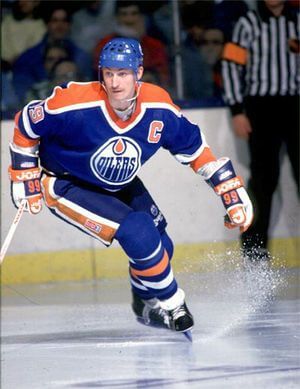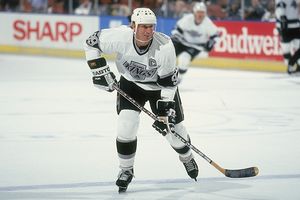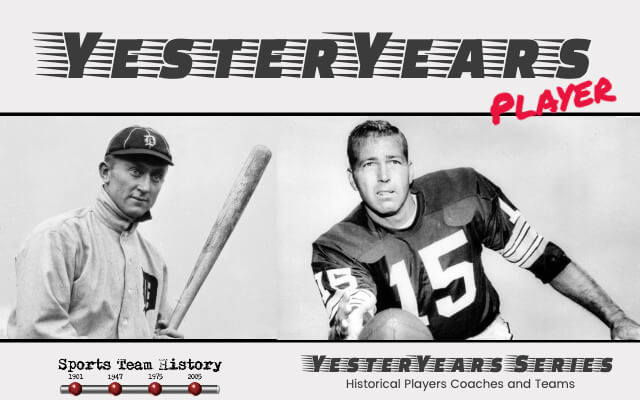Sports Team History has a new series called “YesterYears” which will look at past sporting legends, coaches, and teams. This series will analyze different sports’ greatest players, their coaches, and the dynasty teams.
It is not common for a sportsman to be unanimously considered the GOAT in their professional sport, but by the time Wayne Gretzky was retiring, he held 122 records in professional hockey, 61 of those being NHL records. Gretzky, a kid from Brantford, Ontario, Canada, whose body and underwhelming physical strength told nothing of the incredible read and skill he had for the game of hockey was always a class ahead of his peers from backyard rinks to minor hockey. In a 20-year career of professional hockey across Canada and the United States, Gretzky will not only amaze hockey fans but also make the game a household delight, especially in the US. He was a star on and off the ice, and is widely credited for the popularity hockey gained in Los Angeles and in the US. Wayne Gretzky won four Stanley Cups, all with the Edmonton Oilers with whom he played for 10 years, before his trade to the Los Angeles Kings, where he played eight years and leading them to the Stanley Cup final, before finishing his career with the New York Rangers, after a brief spell with the St. Louis Blues. The only hockey player to score 200 points in a season and do so multiple times, Gretzky has more total assists than some players' total points, and had 14 consecutive 100-point seasons, and that is just the tip of the iceberg for he who was nicknamed "The Great One".
1961 - 1977 The Beginning
Born in Brantford, Ontario, Wayne Douglas Gretzky was the first of five children born to Walter Gretzky and Phyllis Leone. After his birth, his parents decided to move to a house with a surface which permitted them to make an ice rink during the winter so the children could play hockey in what they called the "Wally Coliseum". Walter Gretzky taught his children and their friends hockey, especially the rule that will guide his son for the rest of this career, to go where the puck will be. Wayne will pick up the fundamentals of hockey much faster than everyone else despite his unimpressive physique and lack of speed. An eight-year old who could already play with 10-year olds because of his superior skill, Wayne Gretzky joined the Brantford Nadrofsky Steelers and had accumulated 378 goals, coupled with 139 assists by age 10. Already becoming a media sensation beyond his hometown, Gretzky would have more than 1000 goals by age 13, and would join the Toronto Nationals at age 14, after a legal battle with Canadian Amateur Hockey Association to get him out of a Brantford that was growing hostile against a young prodigy. As a 16-year old playing in a league of 20-year Olds, Gretzky would score 132 points in 60 junior B games for the Toronto Nationals (later Seneca Nationals), winning Rookie of the Year in his first year. This mind-boggling numbers will not stop two teams from underestimating and looking past Gretzky during the 1977 Ontario Major Junior Hockey League draft for 16-year old players. The Sault Ste Marie Greyhounds would take Gretzky at 3rd overall, and this is where he'd wear his famous number 99 for the first time, scoring 70 goals, 182 points and making 112 assists, in 64 games for the Greyhounds.
1978 - 1979 World Hockey Association and a game of Backgammon
In 1978, Gretzky would join the Indianapolis Racers and the World Hockey Association (WHA) on a personal service contract worth $1.5 million. In an uncanny twist of events that would be telling of what was to come, Gretzky would score his first goal for Racers against the Edmonton Oilers who were also part of the WHA. His time with the Racers and WHA would run only eight games, as the already established NHL had negotiated absorbing some WHA teams and the Racers were not making the list. Owner of the Racers, Nelson Skalbania would put Gretzky alongside two other players on a private plane and then offer a high-stakes game of backgammon to Winnipeg Jets owner, Michael Gobuty. If Skalbania won, he got a share of the Jets, and if Gobuty won, he got the players including Gretzky. Michael Gobuty turned down this offer and the plane landed in Edmonton instead, and Gretzky was signed by the Oilers. The 18-year old would sign a 10-year personal-service contract and play the 1979 season with the Oilers in the WHA, scoring 110 points and getting to play with his idol, Gordie Howe, in the All-Star game. The Oilers finished first in the league with Gretzky winning the Lou Kaplan trophy as Rookie of the Year, but the team would lose to the Winnipeg Jets in the Avco World Trophy finals. The WHA would fold and dissolve at the end of the season and the Oilers would join the NHL.
1980 - 1983 The NHL & Proving Pundits Wrong
 Sports Team History
Sports Team History edmonton-oilers-wayne-gretzky
The Edmonton Oilers would make Wayne Gretzky their priority selection during the 1979 Expansion Draft as new teams joined the NHL, the Oilers included. While pundits predicted a tough time for Gretzky due to the increased pace and physicality of the NHL, the kid from Brantford would have no such qualms and a Hart Memorial Trophy as MVP in his first NHL season put everyone on notice. He slightly missed out on the Art Ross trophy because of a technicality, and the Calder Memorial Trophy for Rookie of the Year because he was considered to have played professionally in the WHA. In his second season, however, Gretzky would raze the competition, scoring 50 goals in a record 39 games, a record 92 goals in a season, and then setting records of 120 assists and 212 points in a season. It would mark the beginning of eight consecutive seasons as MVP and seven consecutive as the Art Ross winner. This would also be the second in what would be 14 consecutive seasons with at least 100 points, the first of four 200-point seasons. In 1981, Gretzky would make his debut with the Canadian Men's national hockey team, earning bronze for Canada, in the Canada Cup, despite being the tournament's scoring leader.
1984 - 1988 The Championship Years
The Oilers took some time to acclimate to their new league but within four seasons they were ready to be serious Stanley Cup contenders, with Gretzky influencing their game in a way that was unsettling for other teams in the league. With Gretzky, the Oilers played a more team-based and found it easy to score past opponents who were used to drawing up strategies to stop the star player and not a whole team. Leading the charge and the new wind in the NHL, Gretzky would see his team lose to the New York Islanders in the Stanley Cup final in 1983, before returning the next year to win it against the Islanders the following season. In 1985, Gretzky would get his revenge against the Winnipeg Jets, beating them in the second round of the playoffs, en route to a 4-1 win over the Philadelphia Flyers for their back-to-back Stanley Cup win. The team would fail to capture a third straight championship, but would come back in 1987, again against the Philadelphia Flyers, this time being pushed the distance 4-3. Gretzky again led the way in points and assists as the team captured its third Stanley Cup in four years. In Gretzky's last season as an Oiler, he would again lead the team in points and assists in both regular season and playoffs, taking care of the Boston Bruins in five games to win his and the Oilers' fourth Stanley Cup.
1985 - 1999 Gretzky vs. Lemieux, Gretzky and Lemieux
The eye of the greatest of all time debate, Wayne Gretzky was 24 years old and hitting his peak with the Oilers when fellow countryman Mario Lemieux entered the NHL. The two Canadians made for must-see hockey. Lemieux played for the Pittsburgh Penguins and immediately laid siege on Gretzky's, taking over latter part of the 80s from Gretzky. While the teams of both players faced each other a possible 44 times, both players only faced off 25 times, with injuries playing a large part in limiting their match-ups. However, the most memorable Gretzky vs Lemieux moment came in the 1987 Canada Cup, a tournament in which Gretzky himself declared as the best hockey of his life, starting alongside Lemieux. The two were electrifying and unstoppable, playing for each other, with Gretzky serving up Lemieux for the game-winning goal in the final being on of the highlights of the tournament and Canadian hockey. Gretzky had a longer and more decorated career, but the debate for who is the greatest still persists until this day.
1988 - 1996 The Trade & The Los Angeles Kings
 Sports Team History
Sports Team History Los Angeles Kings Wayne Gretzky
In 1988 after winning the Stanley Cup with the Edmonton Oilers, rumors would begin to swirl about a trade from the Oilers. In what would be dubbed "the trade", Wayne Gretzky would be traded by the Oilers to the Los Angeles Kings, alongside two teammates he handpicked as part of the his conditions for the deal to go through. He would continue his trail of greatness, leading the league in assists for seven more seasons, points for three more, while breaking his idol Gordie Howe's record of 801 goals in a season. He would also lead the Kings to their first ever Stanley Cup final, beating the Oilers en route to a finals loss. Perhaps his biggest impact in Los Angeles was off the ice rink as the presence of Gretzky saw an increase in the interest in hockey in the city and the US. More fans in attendance, and growing interest sparked the creation of two more hockey teams in California, the Mighty Anaheim Ducks and the San Jose Sharks.
1996 - 1999 The Blues, Rangers, and the end
After a season hampered by injury and growing tensions with the new owners of the Kings, Gretzky would move on to the St. Louis Blues for one season, before settling with the New York Rangers as the last team of his career. Before his retirement, Gretzky still managed to top the league in assists, and break the all-time scoring record in the NHL, scoring nine goals in his last season to beat the record by one goal.
Sports Team History takes a look at the history and the logo history of each and every professional sports team to have ever existed from the MLB, MLS, NBA, NCAA, NFL, NHL, Premier League, WNBA, XFL, ABA, AAF or USFL.
Our partner site is Sports Logo History which is a community of sports logo enthusiasts who enjoys the history of each team’s logo history.

